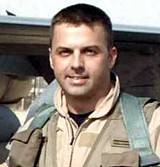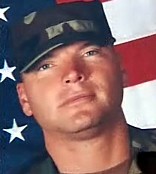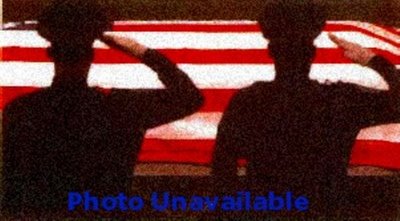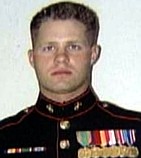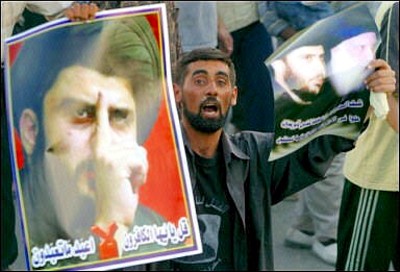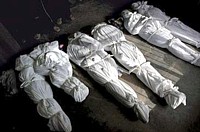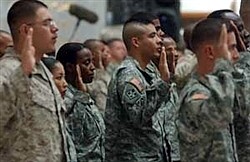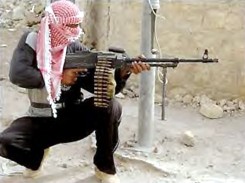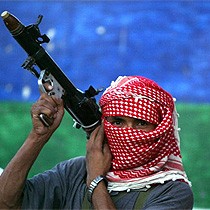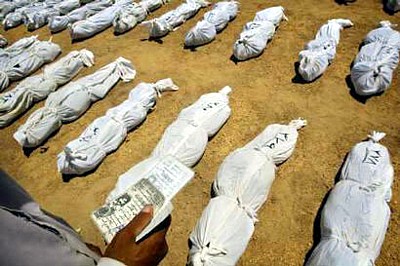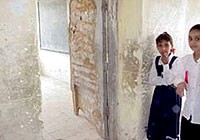
MENANDS -- With a full military burial, Army Sgt. 1st Class Schuyler B. Haynes, a direct descendant of Philip Schuyler, the Revolutionary War general and New York state landowner, took his place today in the Albany Rural Cemetery.
Now his grave is surrounded by those of the members of his historical lineage.
Haynes, 40, was killed Nov. 15 by a roadside bomb that exploded near his Humvee in Baquba, Iraq, where he was a platoon leader in the 1st Battalion, 12th Cavalry, 3rd Brigade Combat Team of the 1st Cavalry Division.
The burial service began at about 1 p.m., when the procession arrived from New York City. The funeral had taken place a day earlier at the Madison Avenue Presbyterian Church.
More than 20 members of the Patriot Guard Riders roared through the winding roads of the cemetery on their motorcycles at the head of the procession.
At the burial site, the riders stood at the top of a hill, holding American flags. Members of the Army and color guard stood at attention and six officers acted as pallbearers of Haynes' silver casket.
A light rain began to fall as mourners gathered for the ceremony, but it subsided as Chaplain Lt. Col. Lee Hardgrove read a couple of poems.
Haynes, who was born in New York City, was buried in the plot of 19th-century Albany mayor John Townsend, a Schuyler descendant.
He had been in the Army for 17 years. During that time, he had worked at jobs such as machine gunner, infantry scout and platoon sergeant. He had received several awards, including the Purple Heart, the Iraqi Campaign Medal and the Humanitarian Service Ribbon.
"He was very patriotic, someone with a tremendous value system,'' said his mother, Sophy Haynes of Manhattan. "He was a big fellow, but everyone described him as gentle.''
The parents and sister of Sgt. Vince Foster, who was in the cavalry with Haynes when he was killed, came from Iowa and Missouri to represent him.
"They shared an apartment together in Fort Hood,'' said Robert Foster. "He said Schuyler was his best friend.''
Killed in the blast with Haynes was Spc. Mitchel T. Mutz, 23, of Falls City, Texas.
Born in 1733, Philip Schuyler was a fourth-generation descent of Dutch immigrants who came to what is now New York and began taking control of much of the land surrounding the Hudson River.
He bought many plots in the Albany area and built the Schuyler Mansion on Catherine Street, which is named after his wife. It is now a state historic site.
Schuyler served as a lieutenant in the French and Indian war and as one of four major generals under George Washington in the American Revolution.
From the Times UnionTears for a heroAs a lone piper led the body of Sgt. Schuyler Haynes into the streets of Manhattan yesterday, part of the upper East Side fell silent.
Traffic stood still as an honor guard carried the soldier's flag-draped coffins from Madison Avenue Presbyterian Church and passersby bowed their heads in respect.
"We so often look at movie stars as heroes," U.S. Army Brig. Gen. Todd Semonite said at Haynes' funeral service.
"In the military, it is men like Sgt. Schuyler Haynes we consider real heroes."
Haynes, 40, died two weeks ago yesterday, blown up by a roadside bomb as he led a patrol through Baquba, Iraq.
The 17-year Army veteran, who grew up on the upper West Side, had been on his second tour in the country. "Whether you were a family member, a friend or a child in a rural Iraqi community ... you are better people," Jimmy Campbell, a soldier who served in Haynes' platoon, told a congregation of hundreds.
"He left us better people."
Haynes, who was named after an ancestor who served as a Revolutionary War general, had always wanted to be a soldier, family members said. "His sister remembered when he was 10 years old, there had been snow and a fight was on," said the Rev. Fred Anderson, who presided over the service. "She was hit in the head by a snowball and she ran inside. He was outraged. 'A soldier does not leave his post.'"
School friend Duer Meehan said little was more important to Haynes than serving his country.
"When he joined the Army, I thought after three to four years he would look to move on," he said. "But, when he kept reenlisting, I realized he had found something he really loved."
Haynes was posthumously awarded the Purple Heart and the Bronze Star. They were given to his parents, Sophy and Robert, at the service.
He was to be buried in a family plot in Albany today.
On Nov. 14, a day before Haynes, another New York City soldier died in Iraq after a Humvee he was riding in was blown up by a roadside bomb in Baghdad. A funeral service for Army Spec. Justin Garcia, 26, of Elmhurst, Queens, was held last week in Congers, Rockland County.
From the Daily NewsFlags, bagpipes at servicesNEW YORK -- Flags waved, a bagpipe wailed "Amazing Grace" and eulogies of courage and comradeship flowed forth in a church on Wednesday for Army Sgt. 1st Class Schuyler B. Haynes, a descendant of a famous Revolutionary War general, who was killed in Iraq two weeks ago.
While no one could explain it exactly, it was clear from the words that Haynes, a 40-year-old college graduate and the quintessence of old New York family, had chosen to be a career noncommissioned officer, staying close to his soldiers, sharing and suffering everything with them on a daily basis.
"He was a loyal friend and courageous leader, equally at home with any soldier, NCO or officer," said Jimmy Campbell, who served with Haynes in Iraq. "He brought out the best in his subordinates and superiors and was absolutely incapable of shirking even the most meaningless duties."
Haynes "just wanted to be where the action was," his father, Robert Haynes, said outside the midtown Manhattan church, where police held honking motorists and buses at bay while pallbearers in Army dress blues carried the flag-covered coffin in a tightly choreographed ritual.
More than 300 mourners, including dozens of family members, nearly filled the Madison Avenue Presbyterian Church.
The pastor, the Rev. Fred Anderson, quoted Schuyler Haynes' sister, Sophy Townsend Haynes, as saying he was "a perfect big brother," even though he made her play "war games," and was at heart a peacemaker.
"A professional soldier is first and foremost a man of peace," Anderson said.
With 17 years of service, Schuyler Haynes was on his second tour of duty in Iraq when he was killed Nov. 15 by a roadside bomb that exploded near his Humvee in Baquba, where he was a platoon leader in the 1st Battalion, 12th Cavalry, 3rd Brigade Combat Team of the 1st Cavalry Division. Also killed in the blast was Spc. Mitchel T. Mutz, 23, of Falls City, Texas.
The elder Haynes said his son was directly descended from Philip Schuyler, a wealthy 18th-century landowner and patriot who served in the British colonial forces and later as one of four major generals in George Washington's Continental Army. Philip Schuyler, who also served twice in the U.S. Senate, fathered a son and four daughters, one of whom became the wife of Alexander Hamilton.
Over two centuries the Schuyler clan was linked through marriage or politics to several other historically prominent New York families _ the Van Cortlandts, Colfaxes, Van Rensselaers and Livingstons. At one time, the Schuylers and the latter two families "owned all the land on both sides of the Hudson from Albany to Tarrytown," Robert Haynes said.
On Wednesday, two dozen members of the Patriot Guard, an ad hoc organization of bikers, most of them military veterans, provided a motorcycle escort and stood at attention with flags in the street as the ceremony began and ended.
Earlier, the deceased's 78-year-old mother, Sophy Haynes, had left the funeral home to shake hands with the Patriot Guard members waiting to escort her son's hearse 11 blocks to the church.
The group was founded two years ago to block anti-war protesters from trying to disrupt military funerals, but with some 50,000 members nationwide it has evolved into a more or less permanent fixture at such events.
"Now it is more like an honor guard paying tribute to the soldiers," said Vietnam veteran Chris Di Costanza, of Thornwood, N.Y.
Brian Sharp, a former Navy diver from the Bronx, said he had traveled 20,000 miles to be present at 36 military funerals in the past year.
No protesters were visible on Wednesday, and only a few pedestrians stood across the street to watch the proceedings.
Duer Meehan, a boyhood friend of Schuyler Haynes, said he had been "proud to be serving a country that allows other people to express their opinions."
During the funeral, Brig. Gen. Todd Semonite, commander of the Fort Hamilton Military Community in Brooklyn, gave Haynes' parents two medals that he had earned, a Purple Heart and a Bronze Star with V for valor.
Haynes was one of two New York state soldiers killed over a two-day period. The day before, Spc. Justin R. Garcia, 26, of New York City, died in the blast of a roadside bomb in Baghdad. He was on his first duty tour in Iraq.
Haynes was to be buried on Thursday at the Albany Rural Cemetery in Menand, N.Y., close to the grave of his namesake, Maj. Gen. Philip Schuyler, who died in 1804.
From NewsdayRelated Link:
Schuyler B. Haynes killed by I.E.D.
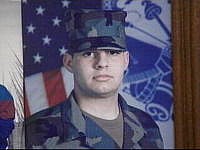 OAK RIDGE — The family of Jon-Erik Loney calls him a hero.
OAK RIDGE — The family of Jon-Erik Loney calls him a hero. 